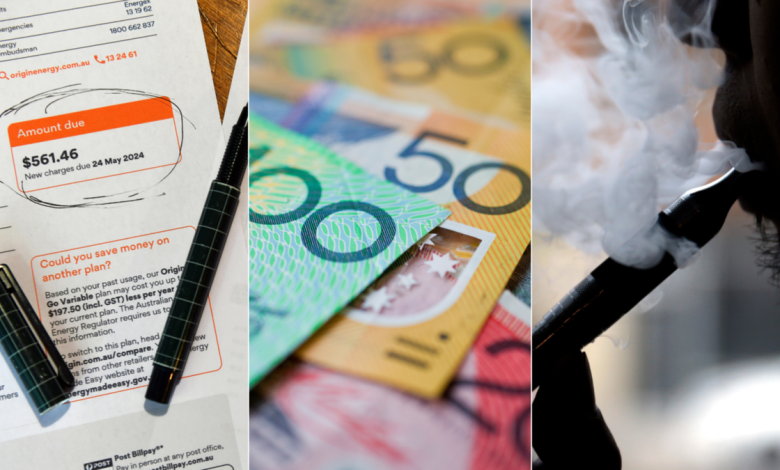More hip-pocket help and less vaping set to come into effect in new financial year

[ad_1]
Tax cuts, energy bill relief and a rise in the minimum wage are among the mid-year changes set to take effect for Australians.
Every taxpayer will keep a little more of what they earn from Monday as the long-planned third stage of tax cuts begins with a mix of other measures designed to ease the cost-of-living crisis.
Some economists have warned that the tax cuts could increase inflationary pressures, which could prompt the Central Bank to keep interest rates higher for struggling households or even raise them.
Get the news with the 7NEWS app: Download today
But with annual inflation hitting a six-month high, consumers are feeling the pinch and are likely to welcome more after-tax payments in their pockets.
“Finally, working people will get ahead again,” ACTU secretary Sally McManus said.
“July is a great month for working people after years of being hit by cost-of-living pressures exacerbated by big business price rises.”
Hip pocket help
Consumers will also enjoy some relief on their electricity bill.
All households will receive a $300 energy bill rebate applied as four quarterly deductions of $75.
Energy prices have skyrocketed as many people, especially welfare recipients, cannot afford to use them.
Paid parental leave will be increased to 22 weeks before increasing to 24 weeks in July 2025 and then to 26 weeks from July 2026.
Australia’s lowest-paid workers will receive a 3.75 per cent increase, with pay rising by 87 cents an hour to $24.10, or $915.91 for a 38-hour week.
Unions pushed for a bigger increase, while business groups argued for smaller wage increases, saying they could not afford rising costs.
The tax cuts cap a series of adjustments designed by the Morrison government in 2018, and there are already calls for more changes to avoid bracket creep, which pushes tax bills higher again over time.
The lowest tax rate for people earning $45,000 or less will drop from 19 percent to 16 percent.
The 32.5 percent rate will be reduced to 30 percent for people earning up to $135,000.
People earning above that figure will be taxed at 37 percent, and the highest tax bracket will start at $190,000 instead of $200,000.
The average worker will receive a cut of $1,888 per year, or $36 per week.
“Australians are under pressure and that’s why our Budget and our economic plan is all about easing inflation and easing the cost of living with tax cuts, energy rebates and more relief coming in from this week,” Treasurer Jim Chalmers said.
“That’s how you provide cost-of-living relief, not with nuclear reactors, which will only increase the cost of energy.”


Other changes that come into effect on Monday include raising the superannuation guarantee rate to 11.5 per cent.
A national ban on artificial stone will begin, with almost 600,000 Australian workers exposed to silica dust.
Modeling from Curtin University predicts around 10,000 people will develop lung cancer directly linked to silica dust.
And under a reform that was passed by federal parliament last week, vapes will only be able to be sold in pharmacies.
Pharmacists will be able to sell low-nicotine vapes without a prescription after discussing the health risks with the customer and confirming they are over 18.
[ad_2]




